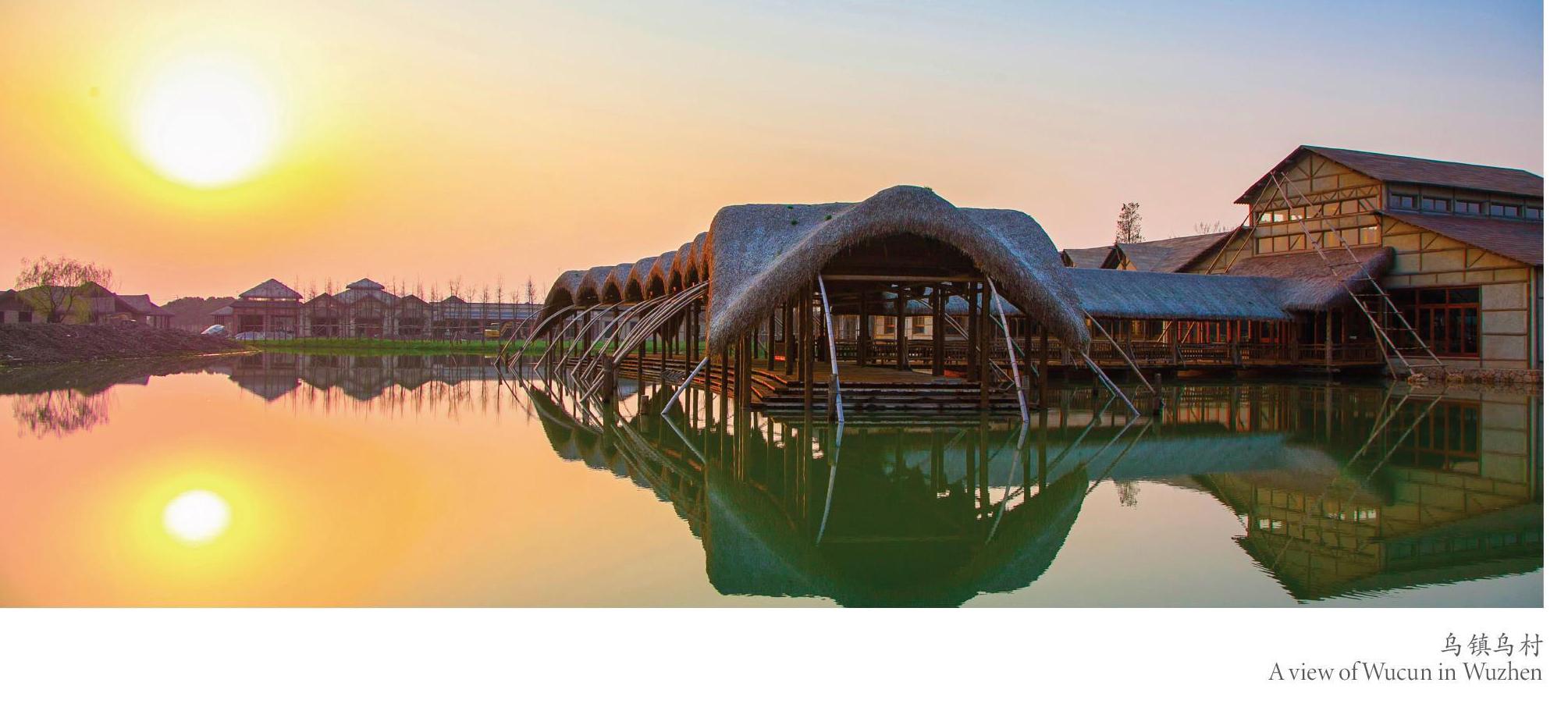来过,不曾离开
2021-03-26


绿树碧水、古朴石桥、粉墙黛瓦、廊棚水阁……无不透露出乌镇这个江南古镇的万千神韵。“唐代银杏宛在,昭明书室依稀。”茅盾在《可爱的家乡》中如是写道,对于家乡乌镇的深情怀念跃然纸上。读过茅盾的《林家铺子》、《春蚕》等小说作品,我们便会深信,每一个作家的故乡,永远是其创作的灵感与源泉。
柔碧而灵动的江南水是乌镇的灵魂,而一座座古桥、一条条小巷便是乌镇的筋脉,古镇的四肢百骸就这样生动起来,秀丽而温情。小桥流水的意境,在乌镇被表达得淋漓尽致。
旧时的乌镇,百步一桥,连缀着两岸人家。其中“姐妹桥”最为著名,这是通济桥和仁济桥的合称,拱形结构,高大雄伟,当地人称之为“桥里桥”。这通济桥以西原是吴兴乌镇地域,桥东则是桐乡青镇地界,所以有则桥联这样写着:寒树烟中,尽乌戍六朝旧地;夕阳帆外,见吴兴几点远山。
置身于姐妹桥,无论站在哪一座桥边,都可以欣赏到桥里有桥、桥里套桥的奇特景观。双虹卧波,交相辉映。看那清澈的江南水碧波粼粼,心灵会顿时温柔起来。此时,或许你会不经意间看到一个探出水阁打水的江南女子,一袭蓝印花布的服饰,盈盈一水间楚楚动人,仿佛走入了唐诗中的江南。
在这样的江南古镇,是适合谈情说爱的,千年情愫、百年缘分因江南古镇的浪漫风情而充满了诗意的怀想。由黄磊、刘若英、李心洁主演的《似水年华》就是在这样小桥流水的古镇拍摄而成的,这部23集的电视剧展现了诗画江南之美。在这幅醉人的水墨画卷中,能有缘相聚便怦然心动,在乌镇和台北之间上演了一场刻骨铭心、永恒思念的爱情童话。
乌镇名扬海内外,不仅仅是因为秀丽的江南风光,更重要的是因其独特的文化蕴涵。小街两侧鳞次栉比的小楼几乎是清一色的乌檐青瓦,走进一条条蜿蜒细长的小巷,踩着断简般的石板路,感受着江南小巷漫长而悠远的意境,元曲中那种幽深飘渺的韵味便弥漫开来。
茅盾故居就坐落在一条名叫“观前街”的巷子里,面街南向,是砖木结构的江南民居,主体是四开间两进深的二层楼房,有茅盾以《子夜》的稿费亲自设计、翻修的书斋。在这书斋中,茅盾创作了中篇小说《多角关系》。庭院里,植有棕榈、天竺、冬青、扁柏等花木。其中,一棵棕榈的枝干已超过七米多高的院墙,天竺郁郁葱葱,枝繁叶茂。据说,这是茅盾亲手种植的。明媚的阳光映照着棕榈、天竺以及其他的花木,显得生机无限。
茅盾原名沈德鸿,字雁冰,早年丧父,而他的母亲是一个坚强而有文学修养的女子,这从她为丈夫所撰写的挽联上可窥一斑:幼诵孔孟之言,长学声光化电,忧国忧家,斯人斯疾,奈何长才未展,死不瞑目;良人亦即良师,十年互勉互励,雹碎春红,百身莫赎,从今誓守遗言,管教双雏。
就是這样一个伟大的母亲,终于把茅盾兄弟培养成才,乌镇有了沈家,文气氤氲而隽永。
在与茅盾故居一桥之隔的中市观后街“夏同善翰林第”,我们一样可感受到文化的巨大力量。这个清代翰林夏同善是乌镇萧氏家的外甥,因自小在外婆家生活、读书,进士及第后,获钦点翰林,知恩图报的夏同善便把皇帝所赐的“翰林第”匾额悬挂在了萧家厅中。作为清光绪年间平反的清代“四大奇案”之一——杨乃武与小白菜冤案的关键人物,夏同善充分发挥了江南文人的智慧与卓识,与浙江籍京官共同联函奏请刑部,为蒙冤的杨乃武与小白菜翻案,终于力挽狂澜,拨云见日。夏同善是“学而优则仕”的代表,他的名字与传说注定要让古镇后人津津乐道。
乌镇文化底蕴之深厚,可以追溯到梁代昭明太子。昭明太子名萧统,两岁时立为皇太子,他随老师沈约来到乌镇读书,并建有书馆一座。萧统自幼好学博闻,通古博今,以编辑《昭明文选》而名世。现存昭明书馆遗迹,是明朝万历年间所建的一座石坊,题有“六朝遗胜”、“梁昭明太子同沈尚书读书处”的匾额。尽管千百年来风侵雨蚀,昭明太子读书遗迹犹存,古镇文脉流传悠远。
2006年,旅居美国纽约24年之久的乌镇游子木心回到家乡定居,这位漂泊海外的“文学鲁宾逊”,一卷《哥伦比亚的倒影》旋即成为我们这个时代的阅读经典。2013年1月,木心的《文学回忆录》问世,从中可以让人充分领略广阔无边的文学世界。富有意味的是,木心故居与茅盾故居处在同一条街上。如果喜爱文学,只要沿着这条古镇老街,从街头的茅盾故居走向街尾的木心故居,你走过的就是中国现当代文学史流光溢彩的一个历程。
木心与茅盾,文学上是存在渊源的。抗日战争时期,孙家少爷三日两头要去沈家老宅——茅盾是木心的“伯伯”辈,战乱时他辗转各地,但老宅书屋里的藏书十分丰富,凡是木心中意的书,他都“一批批拿回家来朝夕相对”,从此开了眼界。木心晚年时回忆起这段经历,称茅盾书屋是他“得以饱览世界文学名著的福地”。尽管木心、茅盾的文学意趣、文化旨归及创作成就等各有千秋,然而他们都是下凡乌镇的文曲星,这是毫无疑问的。
沉静儒雅的木心,气质与禀赋卓异。他是中西方文化蕴育的才子典范,他的随笔、诗歌、小说,他的绘画、音乐,都洋溢着古典的才子气,优雅的贵族气。历经人生磨难的木心,无比丰盈的文化给了他以尊严和高贵,他的眼神始终如少年般纯真与清澈。2011年冬,临终前的木心看到了木心美术馆的设计图,念叨着:“风啊,水啊,一顶桥。”——即使行将往生,木心依然透露出不凡的审美与骨子里的洁净。
2015年11月15日,木心美术馆落成开馆。就在这年的央视春晚,木心的诗《从前慢》演绎成一首歌,郎朗的钢琴、吕思清的小提琴与刘欢的歌唱,豪华组合的视听盛宴,把人们拉回到了朴素的旧时光,静下心来聆听:“从前的日色变得慢,车、马、邮件都慢,一生只够爱一个人……”听着听着,不觉泪流满面。从前的时光再慢,已回不到过去——(当时)木心已去世四年多了,那个孙家老宅里的少年孙璞,那个以“木心”名世的乌镇少年,一生的情人唯有缪斯,他把自己交给了文艺女神,他说过,“全靠艺术生活”。
木心还说过:万头攒动火树银花之处不必找我。如欲相见,我在各种悲喜交集处,能做的只是长途跋涉的归真返璞。多么孤傲,多么决绝,又是那么可爱!
如今的乌镇,除了世界互联网大会,还有乌镇戏剧节,这是国际戏剧交流的文化地标,是促进中西方文化融合的舞台。只要走进乌镇,江南文化的韵味便会芬芳馥郁地袭来。倘若你走得累了,可以在岸边的美人靠坐下来,面对清澈的江南水发呆,想心事,洗涤身心的尘埃,或者走进临街的茶馆歇脚、喝茶、聊天,体验市井风情。茶馆“访卢阁”因为茶圣陆羽而著名,在乌镇中市应家桥南堍,背倚车溪市河,面向中市大街,俯临东市河,遥望观前街风情世态,一边悠闲地喝着茶,一边品尝着乌镇的名点姑嫂饼,任时光流逝而去,心底怡然自如。访卢阁,姑嫂饼,在古镇民间都流传着充满情趣的历史传說,洋溢着亲切动人的文化韵味。
来过,不曾离开。刘若英的乌镇形象代言,具有穿越时空的感染力。乌镇把江南水乡的怀旧元素与人文内涵水乳交融在了一起,便有了故国家园的情愫,丝丝柔柔地缠绕着每一个行人的脚步,从此让你的心灵再也离不开这江南的水乡——乌镇了。
Wuzhen: Natural Beauty, Cultural Splendor
Wuzhen in northern Zhejiang is a typical canal town in Jiangnan or the south of the Yangtze River Delta. Mao Dun (1896-1981), a native of Wuzhen, portrayed his birth place splendidly in his short stories. Nowadays, Wuzhen offers more than tourism attractions. Crisscrossed by rivers and bridges, the scenic river town now doubles as the venue for World Internet Conference and hosts Wuzhen Theater Festival.
In good old times, Wuzhen had more bridges. It is said that there was a bridge every 100 steps. Of all these bridges, the best known are Tongji Bridge and Renji Bridge nicknamed as sister bridges. In the past, west of Tongji Bridge was Wuzhen, part of Wuxing county whereas east of Tongji Bridge was Qingzhen, Tongxiang county.
Though Wuzhen has a long history and prospered in the past thanks to the canal that connects Beijing in the north and Hangzhou in the south, it was in the shadow of history for a very long time in the 20th century. It was not until 2002 that a 23-episode television romance called Remembrance of Things Past brought spotlight on the ancient canal town. It was the first time in the past decades that the poetic beauty of Wuzhen was viewed thoroughly and romantically by the national audience.
Mao Dun was the penname of Shen Yanbing, one of the best known novelists of the first half of the 20th century in China. The writers former residence in the town stands for his reputation. The main component in the courtyard is a two-story house where Mao Dun wrote some of his best know novels and novelettes. The study was decorated in a Japanese architectural style, with copyright royalties of Midnight, one of the best known novels by Mao Dun. The seven-meter-tall palm in the garden is said to have been planted by the writer.
Mao Dun isnt the only celebrity Wuzhen is proud of. Not far from Mao Duns former residence is a grand residence named after Xia Tongshan (1831-1880). Xia grew up in Wuzhen with his maternal grandmother. He later came out as Jinshi in the imperial examination in 1865 and became Hanlin, a member of the Imperial Academy, handpicked by Emperor Xianfeng. The emperor gave Xia a plaque with Hanlin Residence handwritten on it. The plaque was placed at the house in Wuzhen. The house later was redecorated with the imperial approval. Xia had a brilliant career at the imperial court, but he is best known among ordinary people as a judge that successfully reversed a wrongful verdict in a case in the 1870s.
The best known cultural legacy of Wuzhen is what Xiao Tong (501-531) did at Wuzhen. Xiao, best known as Prince Zhaoming of the Liang Dynasty (502-557), came to Wuzhen with his tutor Shen Yue. He was personally tutored and had a library built in the river town. The prince is celebrated in the history of Chinese literature for Zhaoming Anthology, the first collection of poems and prose in China. Wuzhen now boasts a building named after the prince, erected in the Ming Dynasty (1368-1644).
Another cultural celebrity of Wuzhen is Mu Xin, the penname of Sun Pu (1927-2011), a poet and essayist and painter who lived in America from 1982 to 2006 before he came back home in Wuzhen. Sun Pu in his childhood years knew Mao Dun and checked out books from the celebrated writers library many times. The books he read in Wuzhen opened his eyes to the world. Though Mu Xin wrote in a style totally different from that of Shen Yanbing, the two writers are remembered endearingly in Wuzhen. Mu Xin Museum is now a landmark in Wuzhen unveiled in November 2015.
The World Internet Conference, inaugurated in 2014, is now an annual event held in November. The first conference attracted prominent figures from nearly 100 countries. That was Chinas first internet conference of this kind and on this scale and an unparalleled event globally. The Wuzhen Theater Festival is an annual event in the ancient water town, co-founded by Chen Xianghong, Huang Lei, Stan Lai and Meng Jinghui, and organized by Culture Wuzhen Co., Ltd. The festival, one of the premier festivals in China and Asia, attracts international troupes and stages eye-opening shows.
A grand celebration of the art of performance and a hub for cultural exchange amidst the stunning backdrop of ancient canals and alleys, Wuzhen Theater Festival consists of various inter-related parts: the Specially Invited Plays, the Emerging Theatre Artists Competition, the Outdoor Carnival, and the Wuzhen Dialogues, etc. During the festival, the entire town of Wuzhen, which has a history of more than 1,300 years, is transformed into a stage, and theater lovers all over the world are invited to enjoy this tantalizing feast of the theatrical arts.
One of the unique qualities of the Wuzhen Theater Festival is the charm and variety of all of its theater spaces. Within walking distance of each other, there are over ten indoor venues that sport widely differing characteristics--all exuding the charm and beauty of the old town. There is a large amphitheater, and several outdoor plazas suited for performance. These striking venues create a theater cluster that is not only unique in China, but in any theater festival in the world.
For average tourists, however, the internet conference and the theater festival are all the hustle and bustle they avoid. In their eye, Wuzhen is a river town suggesting a traditional lifestyle that goes back to the depth of history and culture and to many centuries ago. One can wander aimlessly in the town, hang out at a riverside teahouse, or visit historical and cultural landmarks casually. This is a town of serenity and peace, a place where a visitor can relax and unwind and can have a good time comparing what one sees in present-day Wuzhen with forgotten past of Wuzhen one can image and let everything of the river town become memories that one can take away and keep in heart.
